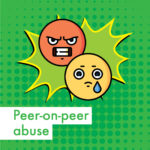Supporting you
We work hard to provide a safe and supportive experience for all our learners.

No matter where you’re starting from in life, or where you're going, everything we do is to help you achieve your ambitions.
We understand that some learners need more support than others and that’s why we’ve invested heavily in our skilled Student Support team. We can support your learning, but also understand that your mental and physical wellbeing is equally as important to us as your studies.
We can work with you, your family or guardians, and external partners to support your learning on full- and part-time courses at college, leisure courses, right through to moving into employment or higher-level learning.
For some people, starting college may be a daunting experience. To help you settle, we offer taster sessions, college tours, summer programmes and support to ensure you adjust to college life quickly.
At Activate Learning, we will always treat you with respect. We expect you to behave in a professional way and to keep yourself safe. When you join us as a student, you will sign a Learner Contract. This lists the standards of behaviour that you agree to demonstrate during your time as a student. We do this because we are committed to creating a community of successful learners, and for everyone to demonstrate the attributes required for this success.
Activate Learning provides a “calm, welcoming and inclusive learning environment” where learners “enjoy their learning and are respectful of their peers and teachers.” Ofsted 2022
If you would like to discuss your support needs with someone, please complete our enquiry form.
Our teams provide a range of support:
Attendance
Sometimes, barriers can prevent us from achieving our best. Sometimes, we all need a helping hand to get back on track. Our team of attendance specialists are here to help you work through these barriers and things that may be holding you back, and make sure you can attend all your lessons to maximise your learning!
Career Support
Our Careers team can help you boost your employability skills. They will work with you to help you understand which careers may be available after your chosen study programme and to develop your knowledge of what your future career might look like. This will help you make informed decisions about your future.
Student Crew
If you are interested in working at college while you study, ask about opportunities to join our Student Crew. We’ve got all kinds of paid work opportunities, and it looks great on your CV!
Computer equipment
As part of our guarantee to enable you to work efficiently, whether on campus or remotely, we have set up a ‘buy your own device’ scheme to enable all learners to buy a laptop or tablet. We want everyone to have access to the right equipment even if they aren’t physically at college. We’ve teamed up with Dell, who can support you with buying a new device.
There is a choice of devices available to choose from and the option to pay via a payment plan, so you can spread the cost. The devices are sold as bundles which includes a case and a warranty and the option to add insurance should you wish to do so.
Visit our online store with Dell
Counselling
Counselling
Study, relationships, money worries... sometimes problems can seem hard to deal with and life can be challenging at times. All our learners have access to a free, confidential counselling service, to help them work through any issues that may be affecting their studies.
Mental health
Mental health difficulties will affect one in four people in the UK each year. Mental health support is an important part of how we help you maintain a good balance between your study, personal life, and other commitments you may have. Many teachers and support staff are trained in Mental Health First Aid to support you on your journey – look out for staff wearing a Mental Health First Aid badge and posters around the college!
On top of this, all our learners have access to a free, confidential counselling service. Our qualified counsellors can discuss your personal, education or work issues. They are experts in offering strategies to handle stress, worries or anxiety. Our aim is to help build resilience and coping strategies, helping you succeed and grow. Students can self-refer, or you can speak to the Student Support Team for more information.
Events and enrichment
Throughout the year, we organise a vibrant range of events and activities to enrich the learner experience at college. This includes charity events, awareness days, and celebrating religious festivals.
Students' Union
Have your say and join the Activate Learning Students’ Union! You could run for one of the executive committee positions or join some of the clubs and societies that are run by students.
Each campus has its own Students’ Union room where you can mix with other students, chill out and relax or work.
Learner Voice and Student Representatives
Your feedback is extremely valuable to us because it helps shape the learning experience for thousands of students every year.
More opportunities to share your views are also available through our Students' Union. Every year, the Student Support team will ask you if you would like to represent your course at college by becoming a course representative.
All course reps are given extensive training to develop the skills, qualities and attributes to represent the rest of their peers.
Faith rooms
Faith rooms are available for you to use on all campuses for prayer and quiet reflection.
Keeping yourself safe
In our everyday lives and at college, we have responsibility to keep ourselves safe on and off campus. At college, everyone must adhere to the Code of Conduct and demonstrate the behaviour and Attributes expected of us.
This is to ensure we can learn and interact in an environment with mutual respect and understanding. Together we can create a safe, fulfilling and positive environment.
Our award-winning Learning Philosophy helps us to understand how to teach and enable people to learn effectively. To bring this to life, we utilise the important relationship between the brain, motivation and emotions. It’s a key topic to keeping yourself safe.
Here are the other topics you need to understand in order to keep yourself safe at college:
- British Values
- Sexual health – Speak Up Speak Out
- Prevent – Extremism, Radicalisation and Incel
- County lines
- Online Safety
- Behaviour – Code of Conduct and Attributes
- Mental Health and Wellbeing
It's important you read the Keeping Yourself Safe booklet.
Learning Support
Staff from the Learning Support team works on every campus to support, help and teach learners, including apprentices and HE students, with a wide range of additional learning support needs. They work to help students access teaching and to develop effective study and personal skills. We want students to make progress on their course, achieve their goals and thrive at college.
Each campus has a Learning Support team.
Come and find the team either on campus or by emailing: gss@activatelearning.ac.uk
NEETs (not in education, employment or training)
We offer two programmes to help support young people who are NEETs (not in education, employment or training) or at risk of becoming NEETs. These programmes build confidence, teach the skills that employers are looking for and provides support in applying for jobs or going onto full-time study.
Our NEET programme
With this programme, young people will have the opportunity to:
- study at one of our campuses one day a week (for a number of weeks)
- sign up for a vocational taster programme (in motor vehicle, construction, catering and more)
- receive the support they need to succeed
Back on Track project
We are working with partner organisations to deliver a free project to help transform the lives of youngsters at risk of becoming NEET (Not in Education, Employment or Training) or who have recently become NEET.
This Building Better Opportunities project is funded by the European Social Fund and the National Lottery Community Fund. It will run until June 2022, focusing on helping young people aged 15–17 across Oxfordshire access the support they need to continue gaining skills and knowledge for their future careers. You can learn more about it on our group website.


Online safety
At Activate Learning, we understand the importance of fostering a safe and secure online environment for all. Our Online Safety Initiative is designed to empower and educate everyone associated with our colleges about the challenges and pitfalls of being online.
Whether you're a student navigating the virtual classroom, a parent concerned about your child's online presence, staff managing educational platforms, or a community member engaging with our resources, we want everyone to feel confident and secure.
Our key focus areas include:
Student empowerment
- Equip students with the tools to recognise and respond to online threats.
- Foster responsible digital citizenship to prepare students for a connected future.
Parental and carer guidance
- Provide parents with resources to understand and navigate their child's online experiences.
- Facilitate open communication about online safety within families.
Staff training
- Offer comprehensive training sessions for staff to stay updated on the latest online safety protocols.
- Foster a culture of vigilance and responsibility among educators and administrative staff.
Community engagement
- Extend our commitment beyond the college gates to the wider community.
- Collaborate with local organisations to create a united front for online safety.
How to get involved?
We invite everyone – students, parents, staff, and community members – to participate in this initiative, either by attending workshops, accessing resources, and joining the conversation to strengthen our collective understanding of online safety.
As we launch, we are focusing on guides for Parents/Carers to understand popular online platforms and strategies for identifying and preventing cyberbullying.
Stay connected
Follow our social media channels, subscribe to newsletters, and check our website regularly for updates, tips, and resources on online safety.
Let's build a safer online community together!
Online Safety Resources
- The National College - Online Safety for Parents and Carers of Children video course
- SWGfL - Online Safety Guidance for Parents summary guide
- Young Minds - Advice and information for parents on online safety
- Department for Education - Advice for parents and carers on cyberbullying
Cyberbullying resources
What is Cyberbullying?
Cyberbullying is the use of digital platforms to harass or harm individuals through hurtful messages, rumours, or offensive content. It inflicts emotional distress and requires awareness, reporting, and prevention measures for online safety.
Online bullying can take many shapes but not all forms are easy to understand.
The most common types of cyberbullying are:
- Baiting - to intentionally make a person angry by saying or doing things to annoy them.
- Catfishing - stealing someone’s profile or setting up fake profiles to lure people into starting online relationships.
- Cyberbullycide - suicide indirectly or directly influenced by cyberbullying experiences.
- Cyberstalking - sending repeated and frequent messages that include real threats of physical harm.
- Dissing - sending or posting information that’s intended to damage someone’s reputation.
- Doxxing - Derived from the term ‘dropping dox’ or ‘documents’, doxing involves searching for and revealing private or identifying information about someone (i.e.. their address or bank account details) for everyone to see – usually with malicious intent.
- Exclusion - deliberately excluding someone from online conversations, games and activities.
- Flaming - sending angry and abusive online messages to intentionally provoke someone into starting an argument
- Fraping - when somebody logs into your social media and impersonates you while posting inappropriate content.
- Ghosting - Mostly used to end romantic relationships, ghosting can also occur between friend groups when one or more of them completely ignores a once-close friend, breaking off all contact and disappearing from all interactions.
- Griefing - abusing and angering people through online gaming.
- Hacking -This occurs when someone bypasses your security settings to gain access to your personal accounts and use the information – often for illegal or malicious activity.
- Happy slapping - an extreme form of bullying where physical assaults are recorded and shared online for public consumption.
- Harassment - targeting an individual or group with persistent and offensive messages which could develop into cyberstalking.
- Outing - publicly sharing personal, private or embarrassing information, photos or videos about someone online.
- Phishing - Manipulating (tricking or persuading) the victim into revealing personal and/or financial information about themselves or their loved ones. This is then used to purchase items in the name of the victim or their parents.
- Revenge porn - practice of posting or distributing sexual videos or images of a another without their consent – often after a painful or non-mutual breakup.
- Sadfishing - where people make exaggerated claims about their emotional problems to generate sympathy and attention.
- Screen name mirroring - Cyberbully creates usernames almost identical to the victims own name to send messages whereby the recipients think they were sent by the target.
- Sexting - sexually explicit text messages or images designed to embarrass the victim when shared online.
- Sextortion - when someone threatens to expose a sexual or compromising image of another person to make them do something or for other reasons, such as revenge or humiliation.
- Trolling - deliberately posting provocative and insulting messages about sensitive subjects or inflicting racism or misogyny on an individual.
- Roasting - ganging up on an individual online and sending offensive abuse until the victim is seen to ‘crack’.
Internet Matters has a host of resources on their What is cyberbullying? wepbage including a What is cyberbullying? - Advice for parents video and 10 things you need to know about cyberbullying.
Online safety when using social media
Here you will find safety and security advice about key social media platforms and apps:
- Facebook - Meta Safety Center
- Instagram - Parent's community
- Snapchat - Common Sense Media - Parents ultimate guide to Snapchat
- Threads - Safer Internet - Threads a guide for parents and carers
- TikTok - Guardians guide
- Twitter - Safety and Security
- YouTube - Safer Internet - Youtube guide for parents and carers
- WhatsApp - Internet Matters - WhatsApp safety guide for parents and carers
Gaming and streaming
Gaming and streaming online offers entertainment, but safety is crucial. Ensuring online safety for young people involves monitoring content, setting age-appropriate restrictions, and educating them on responsible online behaviour.
Parents should implement parental controls, limit screen time, and engage in open communication to address potential risks like cyberbullying. Regularly reviewing and updating privacy settings is crucial for a safer online experience.
- Think U Know - Gaming: what parents and carers need to know
- Internet Matter - Gaming Guide for Teens
- Ask About Games - Video Game Guides
- Connect Safely - Parents guide to Twitch
Cybersecurity
Cybersecurity aims to protect against such threats through measures like encryption, firewalls, and user education. Vigilance, strong passwords, and verifying sources help mitigate the risks of phishing, safeguarding personal and organisational data.
Artificial Intelligence (AI)
AI, or Artificial Intelligence, refers to computer systems performing tasks that typically require human intelligence. It involves machine learning, where systems learn from data, making decisions, recognising patterns, and solving problems. Although the possibilities of AI are exciting it can also be used to content that is not based on fact and identities or images that are fake. Understanding AI is important.
Learn more about AI:
Safeguarding
Safeguarding
We have a team of safeguarding and child protection specialists to respond if you are worried about your own or somebody else’s health, safety or wellbeing, on or off campus. Ultimately, it is everybody’s responsibility to keep our campuses safe and we try our best to foster a strong sense of community. When on campus, we ask that you always wear your lanyard to identify yourself and to access buildings. We want everyone to feel welcome, safe and secure whilst at college.
Safeguarding students at risk of harm
Activate Learning believes everyone has an equal right to live free from abuse and neglect. We have a team of safeguarding and child protection specialists to respond if you are worried about your own or somebody else’s health, safety, or wellbeing, on or off campus. They work closely with partners such as Social Care, Police, and Health, to promote the welfare of children and adults at risk and protect them from harm.
The Safeguarding Team also work with the Police through Operation Encompass, a scheme for sharing information between Police and College about incidents of domestic abuse. You can find more information about this scheme here: https://www.operationencompass.org/
Support for LGBTQIA+
Activate Learning promotes an inclusive learning environment and works closely with community networks to offer as much support as possible to our LGBT+ students.
We facilitate LGBT+ clubs and groups at all our campuses and throughout the academic year, the Student Support Team celebrate the LGBTQIA+ community with a range of external and internal events. Anyone that identifies in the LGBTQIA+ community or as an ally is welcome to come along. The society meets to offer support, fundraise for charities and events, and organise events for the community in college. The society is completely student-led so we need your input!
Activate Learning offer dedicated individual and group support for LGBTQIA+ students at our colleges. We work closely with community networks and clubs to offer as much support as possible. We facilitate LGBTQIA+ clubs and groups at all of our campuses and will continue to expand these groups.
Throughout the academic year, the Student Support team celebrate the LGBTQIA+ community with a range of external and internal events.
We continue to train and upskill our Student Support staff to better support the diverse students at our colleges.
Regardless of age, Student Support can support you with referrals and engagement to other services in the community.
At each of our college campuses we have an LGBTQIA+ society. Anyone that identifies in the LGBTQIA+ community or as an ally is welcome to come along. The society meets to offer support, fundraise for charities and events, and organise events for the community in college. The society is completely student-led so we need your input! If you are interested in coming along to a meeting or joining the society then drop an email to your Head of Student Experience or speak to your local Student Support team on campus.
Support for parents and carers
We know that parents and carers play a pivotal role in supporting their child through college and helping them to make important decisions about their education and future career.
Parents and carers can contact their child’s tutor, Head of Student Experience, or the Student Support Team if they feel their child requires additional support or wishes to discuss any concerns.
The following websites offer helpful advice and support regarding common issues that can affect young people:
- Young Minds - https://www.youngminds.org.uk/
- NSPCC - https://www.nspcc.org.uk/keeping-children-safe/support-for-parents/
- BEAT Eating Disorders - https://www.beateatingdisorders.org.uk/
- Carers Trust - https://carers.org/
- The Proud Trust - https://www.theproudtrust.org/trusted-adults/
- Refuge - https://refuge.org.uk/
- Samaritans - https://www.samaritans.org/
- Talk To Frank - https://www.talktofrank.com/
- Family Lives - https://www.familylives.org.uk/
- Act Early - https://actearly.uk/
- Safer Internet - https://saferinternet.org.uk/
Speak up, speak out - looking after your sexual wellbeing
Everyone should feel comfortable and safe in and outside college. Your wellbeing is intrinsic to your happiness, doing well in your studies and having an enjoyable experience on campus.
Taking care of you and your sexual wellbeing
As part of our Speak up Speak out campaign we are exploring the following topics:
- Consent
- Sharing nudes and sexting
- Porn and revenge porn
- Online sexual abuse
- Sexist stereotypes and sexualised language
- LGBTQ – homophobic and transphobic abuse
- Peer-on-peer abuse
- Sexual harassment
- Sexual violence
- Healthy respectful relationships
Healthy respectful relationships
When you’re in a new relationship, it’s normal to feel excited, special, and happy.
Sometimes relationships can change, and it can be difficult to notice when things are going wrong.
In a healthy relationship, someone shouldn’t try to control or threaten you. This behaviour might be physical, sexual, emotional, financial or psychological.
If your relationship doesn’t feel right, it could be time to walk away. If you don’t feel comfortable doing sexual things with someone, then you don’t have to.
Sex is only OK if both people involved want to have sex. Consent might not always be a straightforward yes or no answer. It’s important to pay attention to your partners words, actions and sounds.
It is important to form healthy relationships and surround yourself with people who make you feel good about yourself.
Your mental health matters
It is important to take care of your mind and body, to take some time for yourself to unwind and do the things you enjoy.
If you are feeling on edge from time to time, that’s normal. You may like to practice your mindfulness, try deep breathing, stretching, meditation or other relaxation techniques.
Be sure to take time to walk in open spaces each day and look at organising your daily routine with a flexible schedule that works for you. Also, allow yourself to indulge occasionally, spend some time with friends, binge your favourite TV series, get lost in a book you’ve been meaning to read or even embrace a new hobby altogether!
If you are seriously struggling with your mental health, the Safeguarding team are on hand to ensure you have the support you need and access to counselling services if required.
Support and information
Everyone has a responsibility to know what’s OK and what’s not OK. Everyone deserves to feel safe, happy and supported where they are. If you are ever affected by any of the topics in this booklet, you can speak to anyone in the Safeguarding Team at Activate Learning.
If you’re a student or parent at an Activate Learning college and you have any questions or concerns, please email safe@activatelearning.ac.uk or contact the Activate Learning Group Safeguarding and Student Support team on 01865 550 401 between 8.30am and 5.00pm on weekdays.
The team can provide advice, guidance and support if you are worried about your own or somebody else’s health, safety or well-being. Whatever it is, the team will always listen and will want you to feel safe, supported and cared for.
Other services that can offer specialist help include:
- The Mix provides free, confidential emotional support for young people aged 16 – 25.
- Young Minds offer a free 24/7 crisis messenger by texting YM to 85258.
- GALOP provides advice and support to members of the LGBT+ community.
- The Survivors Trust has a chat service and a helpline to support people affected by sexual violence or abuse.
- Victims First is committed to making sure that all victims receive the support they need to cope and recover from the impact of the crime.
- Survivors UK supports men who have been raped or sexually assaulted.
- RAINN offer advice and support for people with disabilities who have experienced sexual abuse.
- SafeLink have dedicated support for victims with learning disabilities.
- CEOP’s aim is to protect children from online sexual abuse. You can speak to a child protection advisor who will do everything they can to make you safe.
- Revenge Porn Helpline helps adults that are being threatened to have intimate images shared without consent or have already been shared.
Visit brook.org.uk for more information on sexual health and wellbeing.
Support for students who need a Social Worker, are Cared For or Care Experienced
Activate Learning recognises that learners who need a social worker, are cared for or care experienced, often benefit from additional support with their education. Therefore, we have designated people who ensure that these learners are supported at college through close liaison with teaching staff, parents and carers, social workers, personal advisors, and Local Authorities.
We have a dedicated summer transition programme to support applicants with the change from Secondary School to College. So, please tell the Advice and Admissions Team or the Student Support Team if you have a social worker or personal advisor when you apply or enrol.
Support for Young Carers
A young carer is someone under 18, who provides care for another person who is ill, disabled, has a mental health condition, or addiction problem. Many young carers look after a relative, usually a parent or sibling, and they often taken on practical or emotional caring responsibilities.
We acknowledge that young carers may benefit from early help because of their caring responsibilities, therefore we have a dedicated person within the Student Support and Safeguarding Team to provide additional transition support to our students who care for someone. Please let the Advice and Admissions Team or Student Support Team know if you think this might apply to you.





